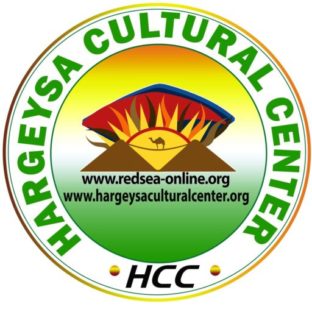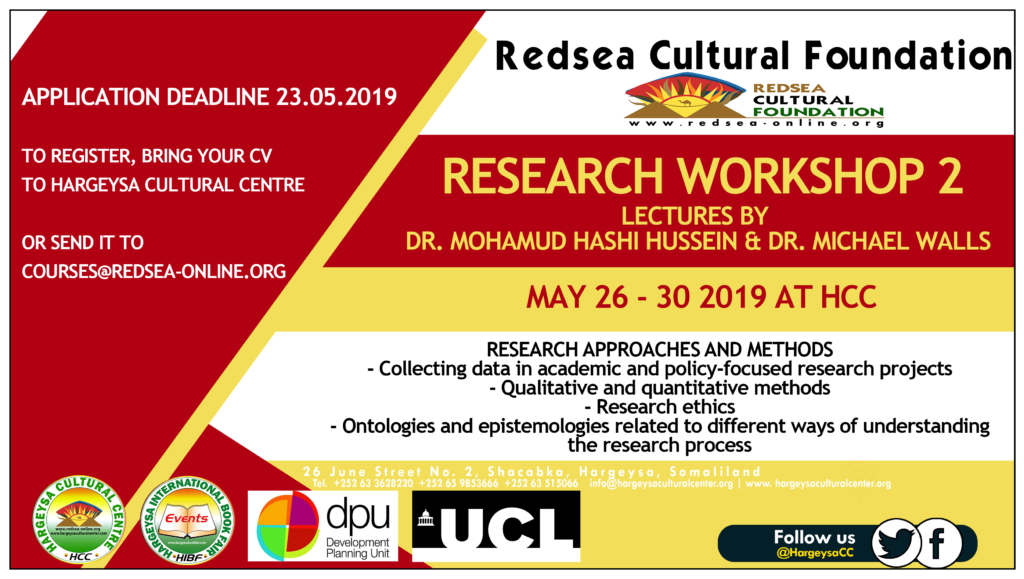
Somaliland is attracting an increasing number and diversity of research projects, offering interesting opportunities for researchers to participate in interesting and potentially valuable projects designed to better understand Somaliland, it’s people and its context. A significant number of young Somali scholars are also pursuing PhDs and other research degrees which call for a similar understanding of research methodologies. This workshop will provide an introduction, over five days, to the different approaches and methods used to collect data in academic and policy-focused research projects. It will cover both qualitative and quantitative methods, and will consider research ethics and the ontologies and epistemologies related to different ways of understanding the research process.
This workshop is being supported by the Development Planning Unit (DPU) of UCL (University College London), UK.
It will be take by Dr Mohamud Hashi Hussein and Dr Michael Walls.
Dr Mohamud Hashi Hussein is an economist with over 20 years of experience in industry, the public sector and research in the UK, and more recently in Somaliland. He has an excellent understanding of the challenges and opportunities for research in the Somali Horn of Africa, as well as in a wide range of thematic areas employing both quantitative and qualitative methods. His research skills and expertise include the quantitative analysis of business responses to regulation and market incentives, and qualitative analysis of behavioural drivers for the uptake of new technologies. Most recent work includes extensive research on the political economy of regulatory policies, including regulatory capture by industry interests.
Dr Michael Walls is a Senior Lecturer at UCL’s Bartlett Development Planning Unit (DPU) and, and for the past fourteen years, his research has focused on the political economy of the Somali Horn of Africa, including the evolving political settlement in Somaliland. He was Chief Observer for the international observation mission to Somaliland’s 2017 presidential election, and has also been a member of the coordination team for missions in 2005, 2010 and 2012 as well as the 2016 Voter Registration process. Michael was Principal Investigator for the ESRC-funded research project ‘Political Settlement in Somaliland: a gendered perspective’, and is currently part of the research team looking at Complex Land Markets in Somaliland and Uganda.
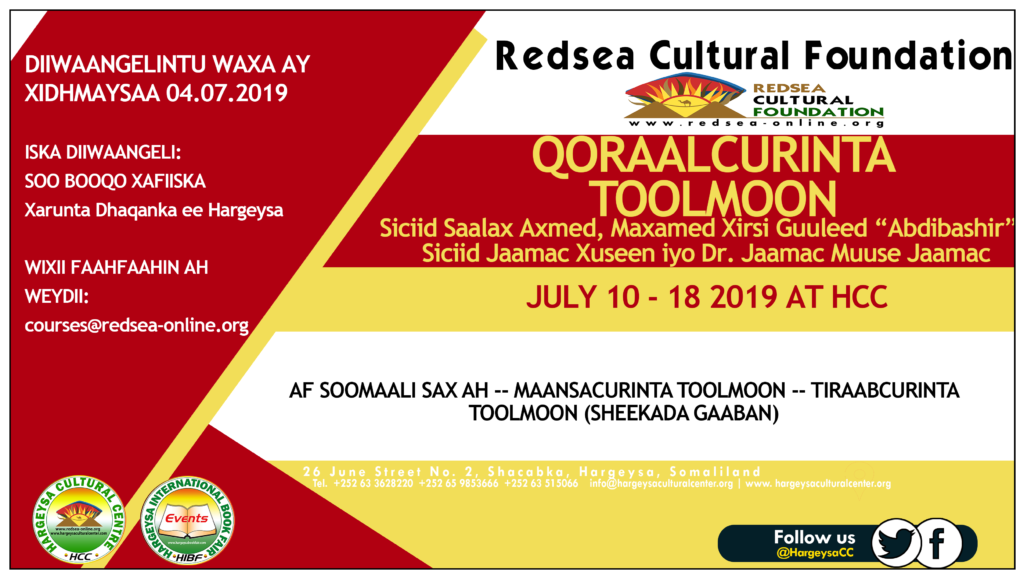
Q O R A A L C U R I N T A T O O L M O O N
(CREATIVE WRITING COURSE - SOMALI)
Tababarrada ku saabsan Qoraal-curinta Toolmoon waa qayb ka mid ah barnaamijka Bandhigga Caalamiga ee Buugaagta Hargeysa. Siddeeddii sanno ee u dambeysay ayay ku qabsoomayeen Xarunta Dhaqanka ee Hargeysa. Himilada Xarunta ayay ka mid tahay sidii loo xoojin lahaa bulshada dhexdeeda dhaqan akhris iyo qoraal ku salaysan, gaar ahaan dhallinyarada dhexdooda.
Falcelintii naga soo gaadhey dadkii tababarradii hore ka qaybgalay iyo tirada hadba sii kordhaysa ee ka muuqata inta soo codsanaysa inay ka qaybgalaan tababarradaas ayaa na faraysa inaan sii wadno tababarradaas annaga oo tiro iyo tayo ahaanba ku dedaalayna in aan kor u qaadno.
Mar walba dadka daneeya inay ka qaybqaataan barnaamijka tababarka, waxaa shardi looga dhigaa inay noqdaan kuwo ku hawllan qoraalka Af Soomaaliga, ama
u heellan inay mustaqbalka qoraanimo isu diyaariyaan. Dadkaa la sheegayo waxaa ka mid ah kuwa ka shaqeeya ururrada bulshada, sida suxufiyiinta, macallimiinta, halabuurka suugaanta iwm.
Si arrintaasi muhimka ah looga midha dhaliyo, mar walba waxaan ku dedaalnaa in loo qabto macallimiin ku xeel dheer aqoontaas in ay ardayda tababaraan.
Saddex qaybood ayaa tababaarradu ka kooban yihiin:
- Af Soomaaliga - Sidii Af Soomaali sax ah loo qori lahaa
- Maansa-curinta toolmoon iyo shuruudaheeda
- Tiraab-curinta toolmoon, gaar ahaan sheekada gaaban iyo hab-qoraalkeeda.
Muddada tababarku soconayo:
10ka - 18ka Julaay 2019
Goobta iyo meeshu waa Xarunta Dhaqanka ee Hargeysa.
Qofka danaynaya inuu ka qayb galo waxa looga baahan yahay:
In uu yimaaddo xafiisyada Xarunta Dhaqanka ee Hargeysa oo ku yaalla Shacabka, Waddada 26ka Juun ee wadnaha Hargeysa, isla markaana is qoro.
In uu xubin ka yahay Xarunta Dhaqanka oo haystaa kaadhka xubinnimada, qofkii aan haysanna marka uu yimaaddo ayuu is diiwaan gelin karaa.
Wixii faahfaahin ah la soo xidhiidh cinwaanka courses@redsea-online.org
Isdiiwaangelintu waxa ay xidhmaysaa Salaasa, 04/07/2019, 2:30 pm.
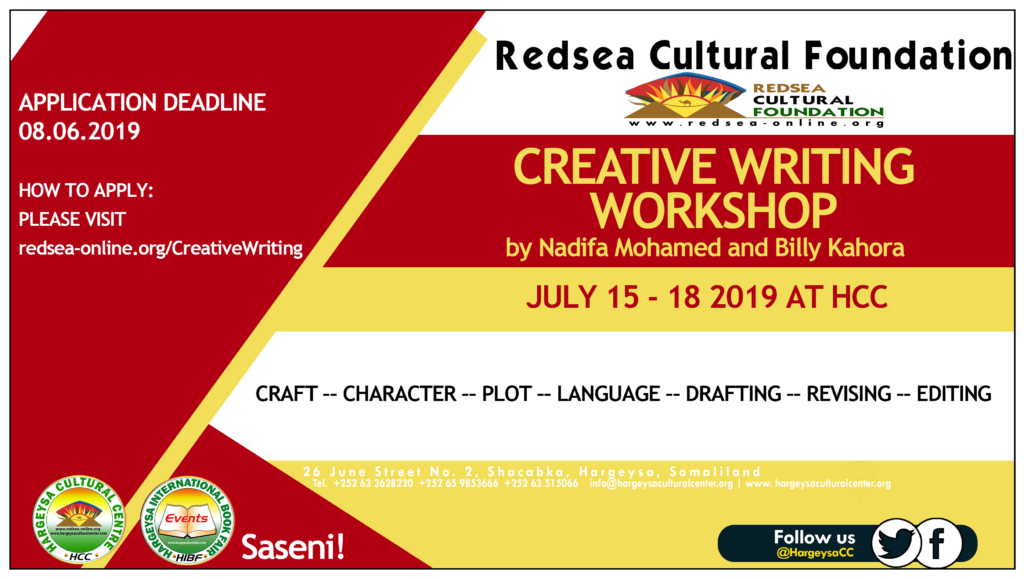
Hargeysa International Book Fair
Saseni! Short Story Workshop
Hargeysa, Somaliland
15-18 July 2019
Calling intermediate and established writers based on the African continent with an idea for a new short story that you want time, space and feedback to develop further! Saseni! and the Hargeysa International Book Fair invite applications for a four-day writing workshop focused on the short story form and facilitated by Nadifa Mohamed and Billy Kahora. Writers will have the opportunity for the stories they work on to be part of the first Saseni! anthology of short fiction which will be published by Huza Press in 2020.
The workshop will offer a series of daily sessions focused on craft, which will explore character, plot and writing’s relationship to place and language, as well as the practicalities of drafting, revising and editing. Writers will also have time each day to read short fiction and focus on their own writing. Each writer selected for the workshop will also have one-on-one tutorials with both of our two experienced workshop facilitators as well as a chance to share their work with peers and get feedback.
An academic writing workshop, organised in collaboration with the journal Eastern African Literary and Cultural Studies and the Universities of Exeter and Bristol, will take place concurrently and we hope this will offer opportunities to build new creative-academic networks and collaborations.
Accommodation will be provided for all participants and the organizers are also able to offer limited travel bursaries for writers based on the African continent, with funding available in particular for Kenyan writers (given Saseni!’s Nairobi roots) and Rwandan writers (in partnership with Huza Press).
Saseni! is a new African creative writing teaching initiative that connects higher and vocational education and the creative arts on the African continent. As part of this work Saseni! hosts workshops and literary events, produces new publications and builds new creative writing and creative industries pedagogies.
Saseni! is inspired by the Kenyan sheng greeting that loosely translates as sasa nyinyi. According to go.sheng.co.ke saseni suggests more than a greeting - it is a call to people of common values and interests. Saseni! is therefore set up to respond to the human innate need for gathering, talking, exchanging and open-ended engagement.
The 12th edition of the annual Hargeysa International Book Fair will be held immediately following the workshop from 20 to 25 July with the theme of coexistence and the guest country of Egypt.
How to apply for the Saseni! Short Story Workshop:
To qualify for the workshop you must be based on the African continent.
If you’d like to be considered for the workshop, please send your application with the email subject ‘HIBF Short Story Workshop to: saseniworkshops@gmail.com
All applications should include the following:
A short fiction extract (no more than 500 words)
A title and short description for the short story you want to work on during the workshop (no more than 100 words). Note - you would need to be ready to share a first draft of the story with the workshop facilitators by 10 July 2019 ahead of the workshop.
An expression of interest (no more than 200 words) outlining your previous writing experience, what inspires you as a writer and why you believe this workshop will benefit you
Your contact details (email, phone and place of residence)
The deadline for receiving applications is Wednesday 5 June 2019. Successful applicants will be notified by Friday 15 June 2019. For further details please visit http://www.redsea-online.org/CreativeWriting
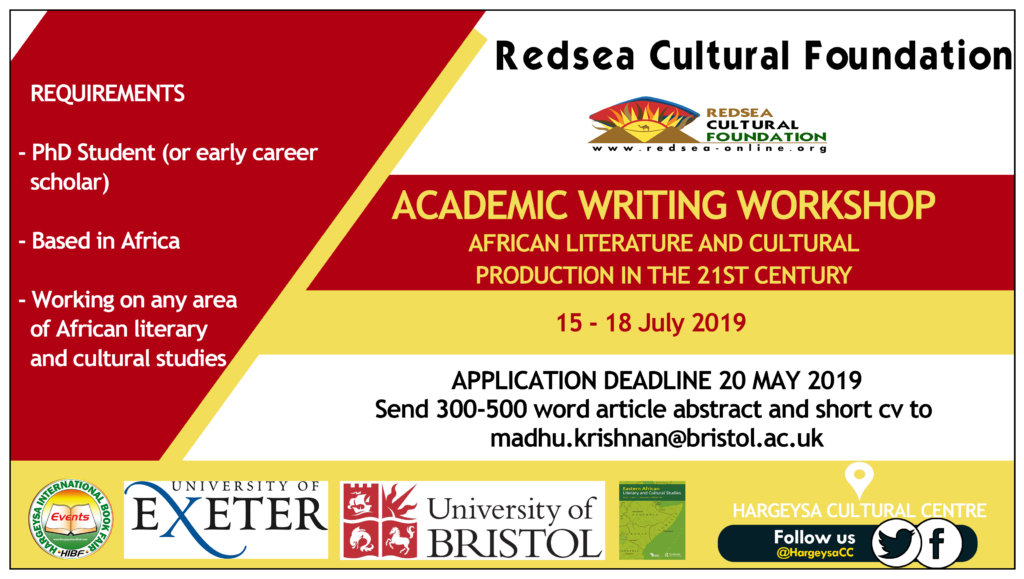
The Hargeysa International Book Fair, in collaboration with the journal Eastern African Literary and Cultural Studies and the Universities of Bristol and Exeter, invites applications to a four-day academic writing workshop for early career scholars based on the African continent. This workshop aims to facilitate the preparation of academic journal articles for submission to and publication in high-impact international journals, while also offering opportunities for mentorship and collaboration.
Organised around the theme ‘African Literature and Cultural Production in the 21st Century’, the workshop will run from 15-19 July 2019, facilitated by the Editors of Eastern African Literary and Cultural Studies and an expert team of academics. Across the four days, participants will learn the basics of how to identify and target appropriate academic journals; the writing, submission and publication process; research methods; writing book reviews; how to adapt conference papers and thesis chapters into journal articles; and writing successful grant applications.
In addition, participants will be paired with a mentor and a peer review group for the duration of the workshop for both peer and one-on-one feedback with the aim of revising draft articles to submission-ready pieces. A range of editors and publishers from high-impact journals publishing research in African literature and cultural studies will provide expert advise and top tips for getting published. Following the workshop, all participants will have the opportunity to engage in a four-month period of mentorship to revise their articles to submission.
We particularly welcome applications from scholars working in the Horn of Africa and Eastern Africa, as well as those working on topics related to literature and culture from these regions. A creative writing workshop facilitated by Billy Kahora and Nadifa Mohamed will take place concurrently, offering opportunities to develop new creative-academic collaborations, and we are especially interested in work which spans this divide.
Accommodation will be provided for all participants, and we are also able to offer limited travel bursaries for scholars based on the African continent.
How to apply:
To qualify for the workshop you must be either a PhD student or early-career (within seven years of PhD award) scholar, based on the African continent and working on any area of African literary and cultural studies (including African cultural history, performance, literatures, music, visual cultures, gender, media and technology, creative industries, cultures of peace, world literature and postcolonial studies). To apply, please send a 300-500 word article abstract and short cv (including date or expected date of PhD conferral) to madhu.krishnan@bristol.ac.uk with the subject line ‘HIBF writing workshop’ by 20 May 2019.
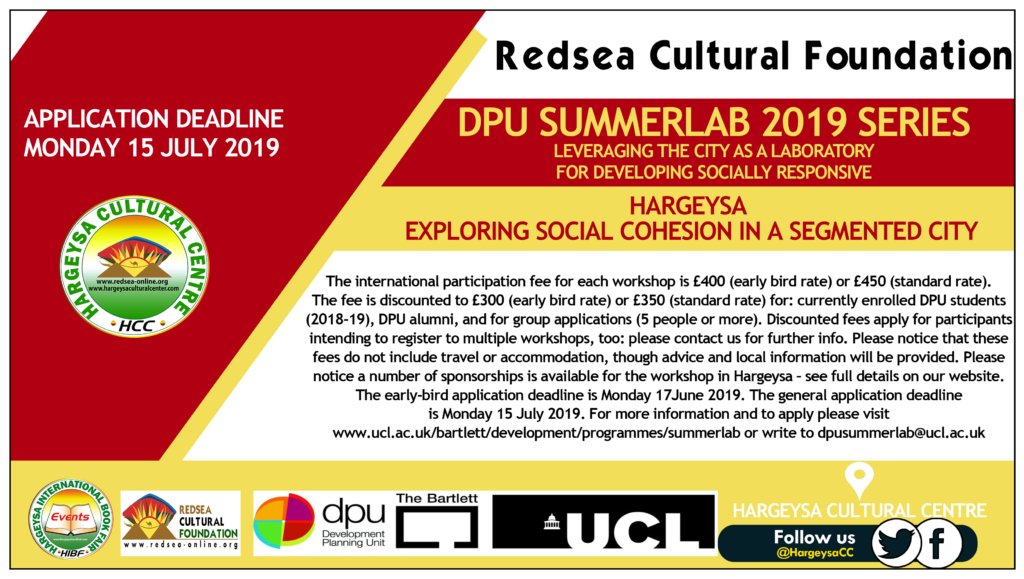
Hargeysa: Exploring social cohesion in a segmented city
In collaboration with the Institute for Research, Heritage Preservation and Development (IRHPD), and Redsea Cultural Foundation
Sunday 1 September to Friday 6 September 2019
Hargeysa, the capital city and commercial hub for the internationally unrecognised state of Somaliland is a rapidly expanding city of about 800,000. Almost completely reduced to rubble by the forces of Siyad Barre’s Somalia government in 1988, this ex-British administrative centre has seen its population mushroom as people have returned from exile in refugee camps in Ethiopia and from a dispersed globally diaspora. The city now houses about a third of Somaliland’s population, although the lack of census data makes that hard to substantiate.
Unilaterally declaring independence from Somalia in May 1991, Somaliland embarked on a series of peace and state-building conferences over the following six years, with major conferences in 1991, 1993 and, finally in Hargeysa in 1997, eventually adopting a new constitution and establishing the basis for a system of multi-party democracy that continues to evolve today. The past 22 years have been notable for their peace and stability. Indeed, it is precisely that period of sustained calm that has enabled Hargeysa’s rapid expansion. The city is today a bustling commercial centre boasting strong links with a diverse array of trading partners around the world, facilitated by sizeable diasporic communities in the Gulf states, US, Canada, Netherlands and UK amongst others.
The city is divided along clan lines, with areas dominated by each of Somaliland’s main clan groups. While there is no formal restriction on where a person may buy land or live, strong social norms ensure neighbourhoods remain relatively segmented. Most housing adopts a villa style within a compound, which retains the pastoralist custom of a temporary dwelling (known as an aqal) in an enclosure. Unsurprisingly, the wealthier the household the more lavish the villa, but most still adopt that broadly similar pattern, from small tin dwellings to large multi-storey structures. A significant number of the poorest, though, live in aqals adapted from rural use, either clustered in Internally Displaced People areas, or dispersed between existing plots.
Infrastructure in Hargeysa has expanded in a haphazard manner as the city has grown. The relatively small municipal electricity grid now extends to an area covering only a minority of those living in the city. Much electric power is supplied by small- or medium-scale neighbourhood generating businesses that use diesel generators. This has the dual effect of making Hargeysa’s power supply remarkably resilient, but also amongst the most expensive anywhere. It is also notably environmentally inefficient. Water is similarly largely privatised, with the piped municipal supply restricted in scope and availability. Most residents rely wholly or partially on supply by donkey cart for the poorer residents or tanker for those who can afford it. Roads are poorly maintained, with many sealed by local communities looking for improved connectivity with the rest of the city.
A rising religious conservatism has affected the city significantly since the 1990s with madrassas (Islamic schools), often funded by patrons in the Gulf, filling the gap left by the collapse of the state-led education system. Also, diaspora Somalis returning from abroad often brought with them a more conservative understanding of Islam based on the salafist or Wahhabist traditions they encountered while away. This has resulted in significant alterations to Somali culture which has long been based on relatively tolerant Sufi traditions that permitted a high degree of mysticism. One consequence of this is that some of the more vibrant aspects of Hargeysa’s street life, which included ‘stereo shops’ with large speakers on the street playing Somali popular and traditional music, and offering bootlegged copies of Bollywood films and music playlists, have completely disappeared.
Somaliland nevertheless boasts a rich array of pastoralist cultural traditions, with poetry playing a central role in social and political discourse. Extended periods of conflict and climate-related crisis –most notably increasingly severe and frequent droughts – have driven urbanisation and resulted in rapid changes in cultural practice. Hargeysa’s physical heritage was largely destroyed in 1988, and what remained has mostly fallen victim to the rapid urban expansion that has occurred since. Nevertheless, the urban form retains many discernible elements that reflect a distinctly Somali identity and culture.
This summerLab will focus on understanding local cultural forms in an urban context substantially altered by past conflict and climate crisis. It will encourage participants (who will, as far as possible, include an equal proportion of local and international delegates) to explore ways that pastoralist and contemporary customs can be retained in a manner that contributes to a positive urban identity in the current period. This will extend to an examination of the ways urban space can be used to encourage social cohesion even where local custom tends to favour the compound dwelling secured behind walls or other barriers. The summerLab will encourage this exploration using a co-working approach, that seeks to bring local and international urbanists together in a dialogue that culminates with the presentation of innovative and exploratory ideas on how Hargeysa might best serve its residents.
